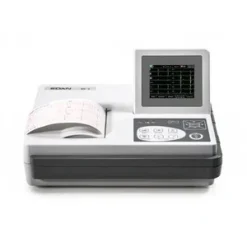An electrocardiogram (ECG machine) is one of the simplest and fastest tests used to evaluate the heart. Electrodes (small, plastic patches that stick to the skin) are placed at certain spots on the chest, arms, and legs. These electrodes connect to an ECG machine by lead wires.
What is an ECG Machine?
An Electrocardiography (ECG) machine is a vital medical device used to measure the electrical activity of the heart over a period of time. This non-invasive tool is essential for diagnosing various cardiac conditions, monitoring heart health, and ensuring accurate medical interventions.
How Does an ECG Machine Work?
An ECG machine works by placing electrodes on the patient’s skin, usually on the chest, arms, and legs. These electrodes detect the tiny electrical changes that occur when the heart muscle depolarizes during each heartbeat. The machine then records these signals, producing a graphical representation known as an electrocardiogram. This graph displays the heart’s rhythm and electrical activity, thereby helping healthcare professionals assess the heart’s condition.
Applications of ECG Machines
Diagnosing Heart Conditions
ECG machines are crucial in diagnosing a wide range of heart conditions, including arrhythmias, heart attacks, and other cardiac abnormalities. Consequently, they help identify irregular heartbeats and assess the severity of cardiac issues.
Monitoring Heart Health
Regular ECG monitoring is essential for patients with chronic heart conditions. It allows doctors to track changes in heart function over time and, therefore, adjust treatments accordingly.
Pre-Surgical Assessment
Before undergoing surgery, patients often require an ECG to ensure their heart is healthy enough for the procedure. This process helps in identifying any underlying cardiac issues that could complicate surgery. As a result, surgeons can make informed decisions about the patient’s readiness for surgery.
Emergency Situations
In emergency rooms and ambulances, ECG machines are indispensable for quickly assessing a patient’s heart condition. Thus, they facilitate rapid and accurate treatment decisions, which can be lifesaving.
Key Features of Modern ECG Machines
High Accuracy
Advanced ECG machines provide precise and reliable measurements, which are crucial for accurate diagnosis and treatment. Moreover, this high level of accuracy ensures that healthcare professionals can trust the data they receive.
User-Friendly Interface
Modern ECG machines are designed with intuitive interfaces, making them easy to use for healthcare professionals. Therefore, even in high-stress situations, medical staff can operate these machines efficiently.
Portability
Portable ECG machines allow for on-the-go monitoring, making them ideal for use in ambulances, home healthcare, and remote locations. Consequently, patients can receive consistent monitoring regardless of their location.
Data Storage and Connectivity
Many ECG machines now come with digital storage and connectivity options. These features enable easy sharing of data with other healthcare providers and integration with electronic health records (EHR) systems. Therefore, patient data can be seamlessly accessed and reviewed by different medical professionals.
Conclusion
In conclusion, an ECG machine is an indispensable tool in modern healthcare. It provides critical insights into heart health and aids in the diagnosis and management of cardiac conditions. Whether in hospitals, clinics, or emergency settings, ECG machines play a vital role in ensuring optimal patient care through precise cardiac monitoring. Consequently, they are a cornerstone of effective cardiac care.


